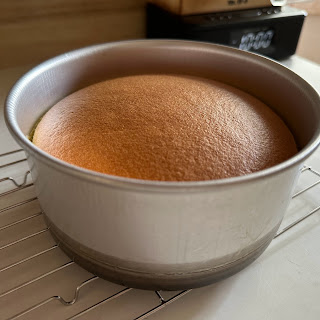Saved your mandarin orange peel and add it to a cake batter, and baked a moist and delicious sponge cake without artificial colouring and flavour 🧡🧡🧡
Yield: 1 round cake
Pan size: 6x3" round pan
Oven type: oven with temperature surround feature
Baking temperature: Preheated oven to 160℃ switching on only the upper heating element, bake at middle rack at 160℃ for 15 minutes. Reduce temperature to 130℃ switching on both upper and lower heating coils, and bake for 30 minutes.
You may have to increase the baking temperature by 10℃ if you are using a normal oven.
Ingredients
All ingredients in room temperature
Using 55g Omega 3&6 eggs
20g unsalted butter/rice bran oil/mild flavour veggie oil
20g rice bran oil/mild flavour vegetable oil
60g top/cake flour
2g milk powder, optional
30g sweetened orange juice
10g honey
10g mandarin orange rind, chopped finely
3 egg yolks
3 egg whites
1/8 tsp low-sodium salt
20g fine sugar
20g raw sugar/fine sugar
Directions
2. Wash the mandarin orange with vegetable wash before using it. This is to get rid of any chemical residue on the fruit skin. Remove the white pith before chopping the mandarin orange peel into fine bits.
3. Mix top flour, and milk powder in a small bowl. Stir to loosen and mix. Set aside.
4. Warm rice bran oil and butter at low temperature till reaching about 75~85℃.
Pour the top/cake flour mixture from Step 3 into the warm oil, mix briefly using a silicone spatula, and remove from the stove. Continue to fold until it becomes a smooth paste.
5. Mix in the mandarin orange juice mixture from Step 2.
6. Combine in the egg yolks, one at a time, and mix into a smooth batter. Set aside.
7. Beat egg whites in a clean, dry and grease-free bowl, till frothy. Add in low-sodium salt, and first batch of the fine and raw sugar mixture. Continue to beat the egg whites at high speed. Slowly add in the remaining sugar mixture in two batches.
Fresh eggs will give a smooth and glossy meringue, while the egg whites of the "old" eggs will be more watery, so it's difficult to achieve nice smooth meringue
 |
| Oops ... I've over-beaten the meringue slightly 😓 |
8. Transfer about 1/4 of the meringue to combine with the yolk batter from Step 6.
Pour back the yolk batter to mix with the remaining meringue into a smooth batter.
9. Pour the batter into the prepared cake pan. Bang the cake pan against the work top to level the batter and to get rid of trapped air bubbles.
Place the cake pan into the 20cm square pan, and fill the square pan with about 1cm deep of hot water.
10. Preheated oven to 160℃ switching on only the upper heating element, bake at middle rack at 160℃ for 15 minutes. Reduce temperature to 130℃ switching on both upper and lower heating coils, and bake for 30 minutes.
My Teka oven HLB840 has a temperature surround feature. You may have to increase the baking temperature by 10℃ if you are using a normal oven.
11. Remove the cake from the oven. Drop the cake with the pan from a height of about 10 cm to a kitchen towel thrice. Let the cake cool down for about 15 to 20 minutes in the pan.
When the cake starts to pull away from the wall of the pan, jiggle to loosen the cake, and turn it out to a cooling rack
You may want to dry the cake in a warm oven for about 15 minutes.
Cut and enjoy 😋😋
































No comments:
Post a Comment
I love seeing your comment and sharing it with other readers. Your comment would be published after moderation. Thank you :)